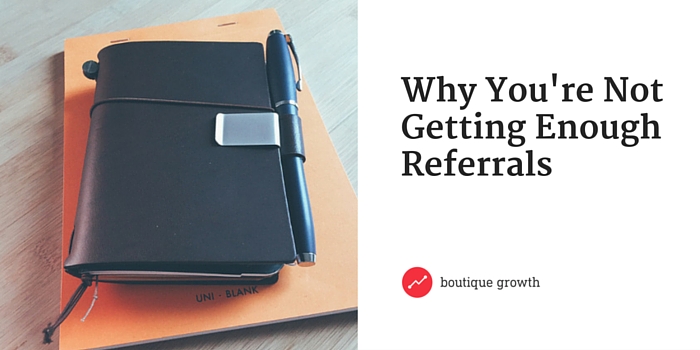
As long as you do great work and deliver outstanding value to your clients, they’ll tell everyone they know, right?
This is the kind of naive thinking that leaves countless professionals spinning their wheels wondering why they can’t get any traction.
Clients don’t make referrals just because you’re good at what you do. Being good at what you do is a prerequisite to even being considered for a referral.
To understand what it really takes to get referrals, let’s take a look at what goes on inside the mind of your client before they make a referral.
#1 – Will I be responsible for this?
If I recommend my accountant to a friend and they have a bad experience — the accountant loses the business and moves on to the next deal, but I’ve lost my credibility.
It works the other way too though. If my friend has a good experience with the accountant, I’m the hero.
But is it worth the risk? Is it worth putting my name on the line when I have no control over the experience itself?
Sure, your client may have had a good experience working with you. But to get the referral, they have to trust that their friend or colleague will also have a good experience.
How do you build that kind of trust?
Be so good at what you do that if a client recommends you to a friend and they have a bad experience — your client will assume the friend was at fault and defend your reputation. Because that’s how good you are.
#2 – What’s in it for me?
This is ultimately what’s going through your client’s mind.
To help your client overcome the apparent risk of making the referral (see Question #1), the incentive has to be clear.
There are two ways to look at this:
- The referral improves your client’s relationship with you. When a client sends you business, you’re more likely to go above and beyond, offer favourable terms, and be more flexible in catering to their needs. When the rewards are aligned, everyone wins.
- The referral improves your client’s relationship with their network. Making a trusted commendation to a friend or colleague is an act of generosity. It makes the one making the referral appear more valuable and triggers the law of reciprocity.
In some cases, formal referral programs that incentivize referral partners with a commission can work really well. But not usually with clients.
#3 – Am I risking my relationship with you?
What if the buyer your client refers to you ends up being a nightmare? What if you end up resenting your client for sending you such a terrible deal?
There will always be a few bad apples that make it through the pipeline. If you can’t weed them out entirely, you can’t expect your clients to either.
There are two ways to mitigate this risk for your client:
- When it happens, don’t hold them responsible. Make your client confident that they can send you business without fear of reprisal if it doesn’t work out. If you don’t address this fear, you’re the one who stands to lose in the end.
- Be crystal clear about who you work with. As a rule of thumb, good clients refer good clients. On the other hand, referrals from bad clients should be approached with a healthy dose of skepticism (luckily, bad clients rarely make referrals).
#4 – Are you going to make me look good?
For existing clients, it’s safe to say that they know, like, and trust you — otherwise they would’ve packed up and gone elsewhere by now.
But that doesn’t necessarily mean they’re comfortable referring business to you.
There’s often a gap between who you do business with and who you want to be perceived as doing business with. If you want a project a certain image of yourself, you won’t make referrals that conflict with that image.
For example, if you have a reputation for being well dressed, you’re not going to tell people that you buy sweat pants from Walmart. It doesn’t align with the image you’re trying to project.
Making a business referral is like unveiling a piece of your business to a friend or colleague. You’ll only do it if it makes you look good.
#5 – Is there a good story to tell?
No one ever said, “Oh you should call my friend John, he’s not the best, but he’s good enough for you.”
If you’re just an average accountant, lawyer, or financial advisor — there’s no story to tell there.
To earn referral business, you have to be the absolute best choice for your ideal buyer.
But you also have to make it clear that you’re the best choice so your clients will make the connection the next time they’re talking to another one of your ideal buyers.
Further exploration: